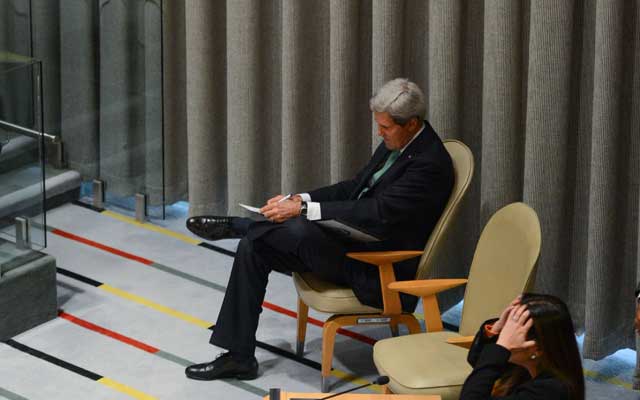As Kerry Signs “Less Than Useless” U.N. Arms Trade Treaty, Congress Responds
Ted Bromund /
Today, Secretary of State John Kerry signed the U.N. Arms Trade Treaty (ATT) on behalf of the United States. The reaction from Congress has been immediate, and rightfully so.
In his remarks at the Signing Ceremony, Secretary Kerry offered the usual tired justifications for the treaty, which will supposedly “lift other countries up to the highest standards,” the ones by which the United States already abides.
The inanity of the idea that a mere treaty will be able to do what U.N. Security Council sanctions have been unable to achieve—i.e., stop nations such as Cuba from shipping arms to North Korea—would be laughable were the subject not so serious. What is particularly ridiculous is the fact that, three years ago, the Administration stated quite plainly that “not getting a universal agreement would make any agreement less than useless.”
Today, the ATT is far from universal, as major irresponsible arms exporters such as China and Russia did not even support it in the consequence-free vote in the U.N. General Assembly. Yet the Administration still supports the “less than useless” treaty. It is not even clear that Secretary Kerry understands what he has signed. In his remarks, the Secretary stated that the treaty “recognizes the freedom of both individuals and states to obtain, possess, and use arms for legitimate purposes.”
That is incorrect. The treaty recognizes that nations, in pursuit of their inherent right of self-defense, have this freedom. But as for individuals, the treaty says only that it is “mindful of…legitimate trade and lawful ownership…where…permitted or protected by law.”
The reaction from Congress has already been impressive. Last night, Senator James Inhofe (R–OK) sent a letter to Secretary Kerry warning him not to sign the treaty. Today, Senator Bob Corker (R–TN) has warned the Administration not to implement the treaty without seeking the advice and consent of the Senate. In the House, Representative Mike Kelly (R–PA) will lead a special order session on the ATT tonight. Further responses are likely in the hours and days to come.
The likelihood of the Senate ratifying the treaty is low. But the Administration may not seriously seek ratification. It may instead rely on the argument that, now that the U.S. has signed the treaty, the executive branch has all the authority it needs to implement the treaty in the U.S. already, even without Senate action.
It is precisely for that reason that individual and collective statements on the treaty—and any hearings that can be organized—are so valuable: They put Congress clearly on record and start building a case for this President, or a future one, to “unsign” the ATT and thereby end this latest foolish experiment with one-sided treaties that affect only the law-abiding democracies of the world.

